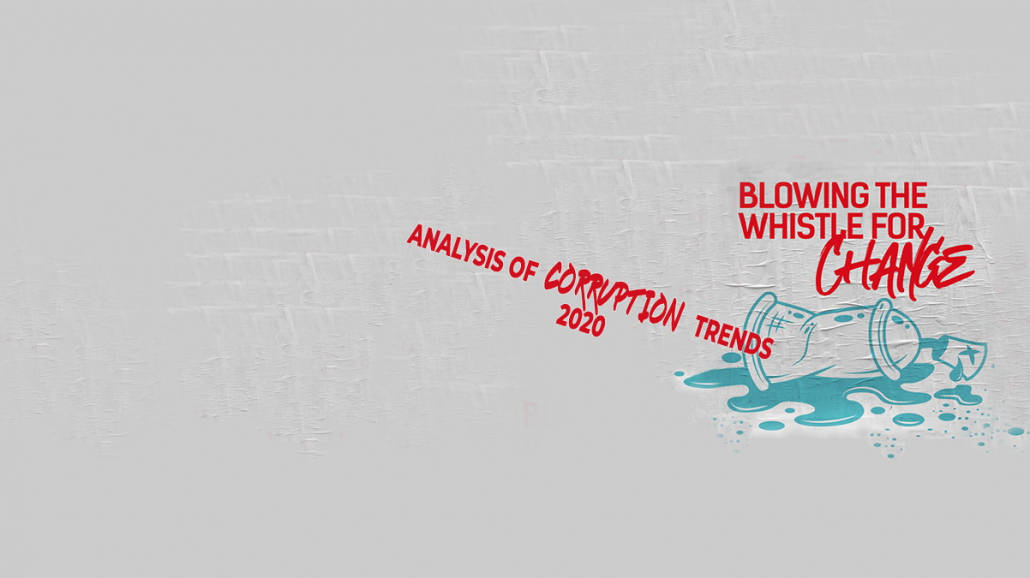The 2020 edition of Corruption Watch’s Analysis of Corruption Trends (ACT) report, released today, demonstrates growing concerns about corruption levels in South Africa. The report also illustrates that the will of the public to expose the corrupt and seek consequences remains strong even during the pandemic.
Almost 2 000 people took the step of blowing the whistle on corruption during the first half of the year. Compared to the same period last year this is an increase of over 400 reports received – not surprising, given the exposure of rampant corruption in Covid-19 procurement. This has enraged ordinary people trying to survive the global pandemic.
“The reports that we receive provide a snapshot of the graft that has manifested in every sphere of government, with the complicity of the private sector, and encompassing multiple sectors in our society,” said Corruption Watch’s Melusi Ncala, primary researcher for this report. “The destruction wrought by corruption is silent but deadly, and it is most often the poorest in society who are brutalised by the actions of these corrupt individuals.”
During this period, almost 55% of reports came in after the declaration in mid-March of the national state of disaster. Of these reports, 13% allege corruption in the South African Police Service (Saps), while municipal offices, schools, and traffic and licensing centres each account for 5% of the reports, and the health sector comes in at 4%. Together, these constitute around a third of the overall number of reports received over the period. For the second consecutive year, corruption in the policing sector has topped the list.
In terms of corruption trends, maladministration, specifically the deliberate delaying of or disregard for legal and official government processes, accounts for 19% of all reports. This is followed by misappropriation of resources at 14% – this includes theft, misuse and abuse of and wasteful spending on state vehicles, equipment, time and funds. Procurement irregularities, also accounting for 14% of reports, relate to irregular awarding of tenders and flouting of related processes. Bribery and extortion and employment irregularities each make up 13% of the total reports received.
Police corruption and abuse
On the subject of police corruption, reports from the public reveal disturbing allegations of brutality, most evident during the early stages of the Covid-19 lockdown. These reports speak to Saps’ lack of humanity and consideration for the members of the public whom it serves, and a blatant disregard for law and order on the part of officers and officials. Perhaps predictably, bribery features in 31% of reports of police corruption, highlighting how police officers solicit bribes from suspects and victims alike, as well as residents. During the lockdown period, officers seemed to act with impunity in both their behaviour and extraction of favours, patterns that also featured in the 29% of allegations relating to abuse of power.
Corruption flourishes in local government structures, according to whistle-blowers. Corruption Watch learned how municipal officials and employees misappropriated resources through embezzlement and mismanagement of funds meant for service delivery or development in communities. These cases account for 35% of the total, while 19% of cases involved procurement corruption, some involving businesses operating as cartels paying kickbacks to councillors in exchange for tenders.
The long-running Corruption Watch campaign exposing corruption in schools still has relevance, as reports of graft by administrators and educators continue to come in. Of the 5% of schools corruption cases, misappropriation of resources accounts for 19%, demonstrating the troubling theft of funds intended for learners, while disregard for procurement processes allows unscrupulous principals, officials, and suppliers to benefit at the extent of the young people in their care.
Covid-19 and corruption
A particularly disturbing corruption trend at the local level has been the theft of food parcels intended for the large groups of the population which suffered massive food insecurity as a result of the Covid-19 lockdown. This brings to light the greed and the lengths that those in power are prepared to go to, to profit at the expense of the most vulnerable.
Corruption Watch received 67 reports of corruption relating to the provision of food parcels during lockdown. In these cases, members of the public were asked to pay or provide favours in exchange for food parcels, while food parcels were distributed according to systems of patronage, and some ward councillors or elected officials allegedly even stole the contents of food parcels.
A recent Corruption Watch report, X-Ray: The critical state of the health sector in South Africa, laid bare the impact of corruption in a key sector severely impacted by Covid-19. In this 2020 ACT report, the 4% of reports highlighting corruption in the health sector indicate the ongoing concerns of vulnerable members of the public. Employment irregularities in this sector constituted the highest percentage of reports at 39%, revealing how those in authority tailored vacancies to favour preferred candidates such as friends, family members or members of political parties. Irregularities in healthcare procurement featured in 14% of the cases, often involving senior officials awarding lucrative tenders to companies with which they had close ties.
“Ordinary people show immense courage in outing these corrupt individuals. They make it clear that the situation must change, this can’t go on. Whether unruly police officers, greedy executives and their government counterparts, teachers and principals at schools who see nothing wrong in stealing food and resources from learners, or health sector professionals who endanger the lives and well-being of the sick through their outright theft of resources, they must all be brought to book,” said Ncala.
Corruption Watch has multiple channels for reporting corruption. Report online at www.corruptionwatch.org.za, or via WhatsApp on 072 013 5569.
Media contact:
Phemelo Khaas phemelok@corruptionwatch.org.za 083 763 3472

